Fernando González
| Fernando González |
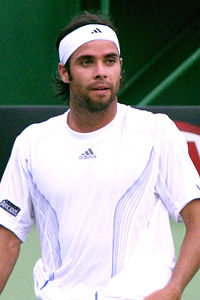 |
| Nickname(s) |
Bombardero de La Reina, Mano de Piedra |
| Country |
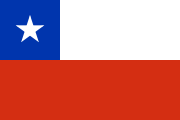 Chile Chile |
| Residence |
La Reina, Santiago, Chile |
| Date of birth |
July 29, 1980 (1980-07-29) (age 29) |
| Place of birth |
Santiago, Chile |
| Height |
1.82 m (5 ft 11+1⁄2 in) |
| Weight |
81 kg (180 lb/12.8 st) |
| Turned pro |
1999 |
| Plays |
Right-handed; one-handed backhand |
| Career prize money |
$6,918,164 |
| Singles |
| Career record: |
310–167 |
| Career titles: |
10 |
| Highest ranking: |
No. 5 (January 29, 2007) |
| Grand Slam results |
| Australian Open |
F (2007) |
| French Open |
QF (2003, 2008) |
| Wimbledon |
QF (2005) |
| US Open |
QF (2002) |
| Major tournaments |
| Masters Cup |
RR (2005, 2007) |
| Olympic Games |
 Silver medal (2008) Silver medal (2008) |
| Doubles |
| Career record: |
96–85 |
| Career titles: |
3 |
| Highest ranking: |
No. 25 (July 4, 2005) |
| Major doubles tournaments |
| Olympic Games |
 Gold medal (2004) Gold medal (2004) |
| Mixed Doubles |
| Career record: |
{{{mixedrecord}}} |
| Career titles: |
{{{mixedtitles}}} |
| Highest ranking: |
{{{highestmixedranking}}} |
|
Infobox last updated on: October 13, 2008.
|
- This is a Spanish name; the first family name is González and the second is Ciuffardi.
Fernando Francisco González Ciuffardi (born July 29, 1980), nicknamed El bombardero de La Reina (Spanish "The La Reina Bomber"), is a professional tennis player from Chile. He is known for having one of the hardest hitting forehands in the circuit.[1] One of his other nicknames is Mano de Piedra ("Stone Hand").
Throughout his career, González has defeated many former number-one players, including Lleyton Hewitt, Andre Agassi, Roger Federer (all while they held the top spot), Rafael Nadal, Andy Roddick, Juan Carlos Ferrero, Carlos Moyà, Gustavo Kuerten, Marat Safin and Pete Sampras.
Tennis career
Early years
González began playing tennis at the age of seven. He moved in with his family to the La Reina commune in eastern Santiago, where he practiced with his coach Claudio González (no relation) at the Club de Leones de La Reina.
As a junior, González achieved the world number one ranking. He won the US Open boys doubles (with compatriot Nicolás Massú) in 1997, and the French Open singles (defeating a young Juan Carlos Ferrero in the final) and doubles (with Venezuelan José de Armas) in 1998. That year, aged 17, he made his Davis Cup debut in Chile's tie against Argentina, losing in four sets to Franco Squillari. He won his first Davis Cup tie in a doubles rubber partnering Massú.
González achieved success at futures level in 1998. In the three futures events held in Chile that year, he reached two semifinals and defeated Italian Enzo Artoni in the final in Santiago.
1999
González became a professional in 1999. In the early stages of the year he played mainly at futures level. He reached his first challenger quarter-final in Edinburgh. He played his first ATP tournament in Washington, defeating Ivan Ljubičić in the first round before losing to Marc Rosset.
2000
González won his first ATP title in May when he defeated Massú at the U.S. Men's Clay Court Championships final in Orlando, Florida. It was the first all-Chilean ATP final since Jaime Fillol defeated Ricardo Acuña in the 1982 Itaparica final.
2002
In February González won his second career ATP title in Viña del Mar by defeating Nicolás Lapentti in the final, and later that year he won his third title in Palermo, Italy and reached the semifinals at the Cincinnati Masters (defeating seeded Tim Henman and Andy Roddick en route), and the quarterfinals at the US Open. In September he surpassed former number one player Marcelo Ríos as the top Chilean in the singles rankings, and was one of the most improved players on the ATP circuit, jumping 118 positions in the ATP Champions Race.
2004
In February, González repeated his Viña del Mar title by defeating Gustavo Kuerten in the final. In August, at the Olympic Games in Athens, he and doubles partner Massú gave their country its first ever Olympic gold medal, when they defeated Nicolas Kiefer and Rainer Schüttler of Germany to win the men's doubles tournament. He also won a bronze medal in the men's singles.

Fernando González at training for the World Team Cup, in 2005.
2005
González began the season by taking the title in Auckland, New Zealand —his first hard court title— in January. In April he won his first ATP doubles tournament (and second after the Olympics), in Valencia (clay) with doubles partner Martín Rodríguez. After reaching the quarterfinals at Wimbledon in June, he went on to win the ATP tournament in Amersfoort (clay), The Netherlands in the following month. He further proved his all-court versatility by winning the indoors-carpet singles title at Basel as well as winning the doubles title in the same tournament with partner Agustín Calleri. The results for 2005 were enough for him to attend the year-end Masters Cup in Shanghai, first as a reserve, and then as a player due to the withdrawal of Andre Agassi after his first match. González became the first Chilean to win a Masters match when he beat Mariano Puerta and just missed out on making the semifinal—and finishing the year as number 10—after losing to Gastón Gaudio in a match in which he had three match points.
2006
In April González became the third Chilean (after Ríos and Massú) to break into the top ten singles ranking. He reached number 10 in the world after winning a quarterfinal match at the Monte Carlo Masters—shortly after parting ways with longtime coach Horacio de la Peña, who was then replaced by Larry Stefanki in May. After reaching his first Masters Series singles final in Madrid (losing to Roger Federer in straight sets) in October, he ascended to world number seven. He finished the year at number ten.
2007
In January González reached the Australian Open singles final, thereby becoming the first Chilean to have reached the quarterfinal round in all four Grand Slam tournaments, and the fourth Chilean (third male) to have reached a Grand Slam tournament final. He beat —in succession— Lleyton Hewitt, James Blake, world number two Rafael Nadal, and Tommy Haas en route to the final, which he lost to world number one Roger Federer in (relatively close) straight sets. On January 29 he jumped to number five, his best career singles ranking, and only five points behind number four. In May he became the first Chilean to reach the finals of the Rome Masters since Ríos won the title in 1998. From July to August, González went on a five-match losing streak, which ended in September, when he captured the China Open tournament title in Beijing. In November he became the first Chilean since Ríos in 1998 to directly qualify for the Tennis Masters Cup. On his opening match, he staged a huge upset by beating top-ranked Federer for the first time in eleven encounters. He then lost to Andy Roddick and Nikolay Davydenko, finishing last of his group. He ended the season at number seven, his highest year-end ranking to date.
2008
At the Australian Open, in January, González failed to defend the totality of the points obtained the year earlier, and fell from 7th to 24th place in the ATP Singles Ranking. He bounced back the following week, winning his home event of Viña del Mar for the third time, rising to number 16. In May he won his 10th ATP title at the BMW Open in Munich. The following month, he reached the quarters of the French Open for the second time, losing to number-one seed Roger Federer in four sets. In August, González represented Chile at the Beijing Olympic Games in both singles and doubles events. At the Games' opening ceremony, he was his country's standard bearer. As in Athens 2004, he partnered with Massú in doubles, but was unable to defend his gold, exiting in the first round. In singles, he improved his Olympic record, clinching a silver medal, after beating James Blake of the United States in the semifinals. In the gold medal match, he lost in straight sets to Spain's Rafael Nadal. At the 2008 U.S. Open in September, he lost in the 4th round to former U.S. Open champion, Andy Roddick 2-6, 4-6, 1-6. This however, secured his return into the top 10. In November, at the end of the season, Stefanki ceased coaching González after a job offer from Roddick.[2]
Playing style
González plays as an offensive baseliner. His groundstrokes, especially on the forehand side, are extremely powerful, even amongst his contemporaries. His forehand has incredible spin and pace, which makes his forehand one of the heaviest shots in tennis. His speed and agility allow him to hit winning shots from practically anywhere in the court. However, as offensive baseliners are, he used to be prone to make a huge number of unforced errors and was less consistent. His new coach, Larry Stefanki, has helped him develop an extreme slice backhand which combined with his aggressive forehand has propelled his retrieving abilities to a new level and has given him much more consistency, resulting in fewer unforced errors. In addition, he can also approach the net by chipping and charging and has a wide array of passing shots including the slice backhand passing shot, rarely used in modern tennis.
González's serve has also changed since he started working with Stefanki. His first serve used to be only a flat serve, but since late-2006 he has increasingly used a three-quarter of strength slice serve to move his opponents out of the court and increase his precision. The addition of an extreme slice backhand and a slice serve have made him a markedly better player as he has a wider array of choices to get him out of jams or move his opponents to set up his powerful forehand.
Personal life
González was born in Santiago, Chile. His father, Fernando González, is the manager of a flour mill in Santiago and his mother, Patricia Ciuffardi, a housewife.
González is a very private person and rarely discusses aspects of his personal life with the press. He did confirm, though, in a newspaper interview, that he was dating Argentine tennis player Gisela Dulko.[3]
Career statistics
Grand Slam singles finals (1)
Runner-up (1)
ATP Masters Series singles finals (2)
Runners-up (2)
Career finals
Singles (21)
Wins (10)
|
|
| Titles by Surface |
| Hard (2) |
| Clay (7) |
| Carpet (1) |
|
| Titles by Surface |
| Outdoors (1) |
| Indoors (9) |
|
| No. |
Date |
Tournament |
Surface |
Opponent in the final |
Score |
| 1. |
May 7, 2000 |
Orlando, Florida, U.S. |
Clay |
 Nicolás Massú Nicolás Massú |
6–2, 6–3 |
| 2. |
February 17, 2002 |
Viña del Mar, Chile |
Clay |
 Nicolás Lapentti Nicolás Lapentti |
6–3, 6–7(5), 7–6(4) |
| 3. |
September 29, 2002 |
Palermo, Italy |
Clay |
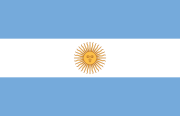 José Acasuso José Acasuso |
5–7, 6–3, 6–1 |
| 4. |
February 15, 2004 |
Viña del Mar, Chile |
Clay |
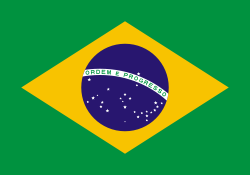 Gustavo Kuerten Gustavo Kuerten |
7–5, 6–4 |
| 5. |
January 16, 2005 |
Auckland, New Zealand |
Hard |
 Olivier Rochus Olivier Rochus |
6–4, 6–2 |
| 6. |
July 24, 2005 |
Amersfoort, Netherlands |
Clay |
 Agustín Calleri Agustín Calleri |
7–5, 6–3 |
| 7. |
October 30, 2005 |
Basel, Switzerland |
Carpet (i) |
 Marcos Baghdatis Marcos Baghdatis |
6–7(10), 6–3, 7–5, 6–4 |
| 8. |
September 16, 2007 |
Beijing, China |
Hard |
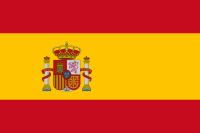 Tommy Robredo Tommy Robredo |
6–1, 3–6, 6–1 |
| 9. |
February 3, 2008 |
Viña del Mar, Chile |
Clay |
 Juan Mónaco Juan Mónaco |
walkover |
| 10. |
May 4, 2008 |
Munich, Germany |
Clay |
 Simone Bolelli Simone Bolelli |
7–6(4), 6–7(4), 6–3 |
Runners-up (11)
| Legend |
| Grand Slam (1) |
| Olympic Silver (1) |
| ATP Masters Series (2) |
| ATP Tour (8) |
|
| Finals by Surface |
| Hard (6) |
| Clay (3) |
| Carpet (2) |
|
| Finals by Surface |
| Outdoors (6) |
| Indoors (5) |
|
| No. |
Date |
Tournament |
Surface |
Opponent in the final |
Score |
| 1. |
October 27, 2002 |
Basel, Switzerland |
Carpet (i) |
 David Nalbandian David Nalbandian |
4–6, 3–6, 2–6 |
| 2. |
August 3, 2003 |
Washington, DC, U.S. |
Hard |
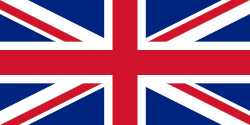 Tim Henman Tim Henman |
3–6, 4–6 |
| 3. |
October 5, 2003 |
Metz, France |
Hard (i) |
 Arnaud Clément Arnaud Clément |
3–6, 6–1, 3–6 |
| 4. |
July 18, 2004 |
Amersfoort, Netherlands |
Clay |
 Martin Verkerk Martin Verkerk |
6–7(5), 6–4, 4–6 |
| 5. |
February 6, 2005 |
Viña del Mar, Chile |
Clay |
 Gastón Gaudio Gastón Gaudio |
3–6, 4–6 |
| 6. |
October 15, 2006 |
Vienna, Austria |
Hard (i) |
 Ivan Ljubičić Ivan Ljubičić |
3–6, 4–6, 5–7 |
| 7. |
October 22, 2006 |
Madrid, Spain |
Hard (i) |
 Roger Federer Roger Federer |
5–7, 1–6, 0–6 |
| 8. |
October 29, 2006 |
Basel, Switzerland |
Carpet (i) |
 Roger Federer Roger Federer |
3–6, 2–6, 6–7(3) |
| 9. |
January 28, 2007 |
Australian Open |
Hard |
 Roger Federer Roger Federer |
6–7(2), 4–6, 4–6 |
| 10. |
May 13, 2007 |
Rome, Italy |
Clay |
 Rafael Nadal Rafael Nadal |
2–6, 2–6 |
| 11. |
August 17, 2008 |
Beijing Olympics |
Hard |
 Rafael Nadal Rafael Nadal |
3–6, 6–7(2), 3–6 |
Doubles (4)
Wins (3)
| Legend |
| Olympic Gold (1) |
| ATP Tour (2) |
| No. |
Date |
Tournament |
Surface |
Partnering |
Opponents in the final |
Score |
| 1. |
August 21, 2004 |
Athens Olympics |
Hard |
 Nicolás Massú Nicolás Massú |
 Nicolas Kiefer Nicolas Kiefer
 Rainer Schüttler Rainer Schüttler |
6–2, 4–6, 3–6, 7–6(7), 6–4 |
| 2. |
April 10, 2005 |
Valencia, Spain |
Clay |
 Martín Rodríguez Martín Rodríguez |
 Lucas Arnold Ker Lucas Arnold Ker
 Mariano Hood Mariano Hood |
6–4, 6–4 |
| 3. |
October 30, 2005 |
Basel, Switzerland |
Carpet (i) |
 Agustín Calleri Agustín Calleri |
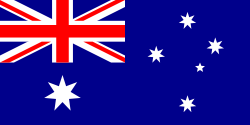 Stephen Huss Stephen Huss
 Wesley Moodie Wesley Moodie |
7–5, 7–5 |
Runner-up (1)
| No. |
Date |
Tournament |
Surface |
Partnering |
Opponents in the final |
Score |
| 1. |
July 24, 2005 |
Amersfoort, Netherlands |
Clay |
 Nicolás Massú Nicolás Massú |
 Martín García Martín García
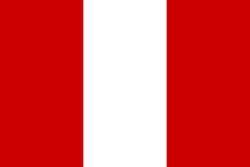 Luis Horna Luis Horna |
4–6, 4–6 |
Team competition wins
- 2003 - World Team Championship, Düsseldorf, Germany (Clay)
- 2004 - World Team Championship, Düsseldorf, Germany (Clay)
Other wins
| No. |
Date |
Tournament |
Surface |
Opponent in the final |
Score |
Notes |
| 1. |
August 21, 2004 |
Athens Olympics |
Hard |
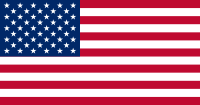 Taylor Dent Taylor Dent |
6–4, 2–6, 16–14 |
Bronze medal match |
Singles performance timeline
| Tournament |
2000 |
2001 |
2002 |
2003 |
2004 |
2005 |
2006 |
2007 |
2008 |
Career win-loss |
| Grand Slam Tournaments |
| Australian Open |
A |
1R |
4R |
2R |
1R |
3R |
1R |
F |
3R |
14-8 |
| French Open |
Q |
2R |
3R |
QF |
1R |
3R |
2R |
1R |
QF |
14-8 |
| Wimbledon |
A |
Q |
2R |
1R |
3R |
QF |
3R |
3R |
2R |
12-7 |
| US Open |
2R |
Q |
QF |
3R |
1R |
3R |
3R |
1R |
4R |
14-8 |
| Win-Loss1 |
1-1 |
1-2 |
10-4 |
7-4 |
2-4 |
10-4 |
5-4 |
8-4 |
10-4 |
54-31 |
| Year-End Championship |
| Tennis Masters Cup |
A |
A |
A |
A |
A |
RR |
A |
RR |
|
2–3 |
| Olympic Games |
| Summer Olympics |
A |
Not Held |
SF-B |
Not Held |
F |
10–2 |
| ATP Masters Series |
| Indian Wells Masters |
A |
A |
2R |
1R |
3R |
4R |
2R |
4R |
2R |
10-7 |
| Miami Masters |
A |
A |
4R |
2R |
SF |
3R |
3R |
3R |
3R |
11-7 |
| Monte Carlo Masters |
A |
A |
1R |
1R |
1R |
3R |
SF |
2R |
A |
6–6 |
| Rome Masters |
A |
A |
3R |
A |
2R |
1R |
QF |
F |
3R |
11-6 |
| Hamburg Masters |
A |
A |
2R |
QF |
3R |
2R |
3R |
QF |
A |
11-6 |
| Canada Masters |
A |
A |
1R |
1R |
3R |
1R |
SF |
2R |
2R |
7–7 |
| Cincinnati Masters |
Q |
A |
SF |
2R |
2R |
3R |
SF |
2R |
1R |
12-7 |
| Madrid Masters (Stuttgart) |
A |
A |
2R |
1R |
2R |
QF |
F |
QF |
2R |
9–7 |
| Paris Masters |
A |
A |
1R |
1R |
2R |
2R |
2R |
2R |
A |
0–6 |
| Total Titles |
1 |
0 |
2 |
0 |
1 |
3 |
0 |
1 |
2 |
10 |
| Year End Ranking |
115 |
139 |
18 |
35 |
23 |
11 |
10 |
7 |
15 |
N/A |
A = did not participate in the tournament.
Q = lost in qualifying draw.
1. The win total does not include walkovers.
References
External links
|
Tennis at the Summer Olympics • Olympic Champions in men's doubles |
|
|
|
|
|
|

